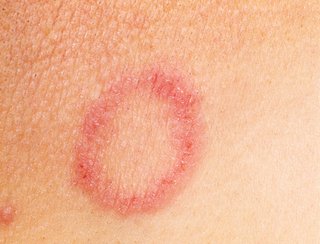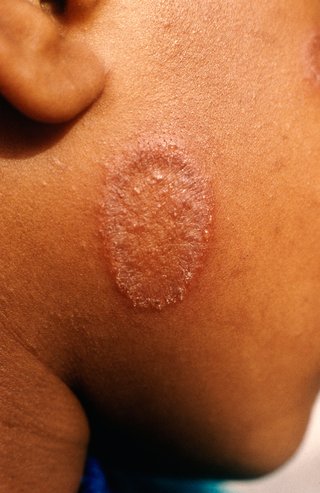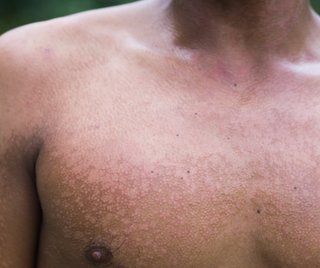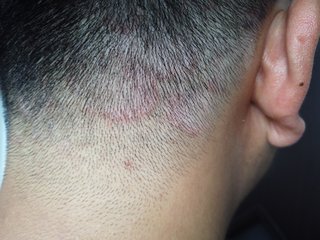Ringworm is a common fungal skin infection. It's not caused by worms. It can appear anywhere on the body, including the scalp, groin and feet.
It's most common between the toes where the skin becomes white and soft, with sore red skin underneath. This is known as athlete's foot. Ringworm on the groin is often called jock itch.
You can usually buy medicine from a pharmacy to make it go away.
Check if it's ringworm
The main symptom of ringworm is a red or silver rash.
The rash may be scaly, dry, swollen or itchy.

But not all circular rashes are ringworm. Other causes include eczema and psoriasis.



Other common fungal infections
Common fungal infections include:
Treatment for ringworm
Talk to a pharmacist first if you think you have ringworm. They can look at your rash. They'll recommend the best antifungal medicine.
Antifungal medicine
Antifungal treatments for ringworm are available as:
- creams
- gels
- sprays
It will depend on where the rash is.
Some of these creams include:
- clotrimazole
- terbinafine
Your pharmacist will be able to advise you on what cream is best for you.
You may need to use antifungal medicine every day for at least 2 weeks. It's important to use it for the right amount of time, even if your rash goes away.
A pharmacist will tell you if they think you should contact a GP.
Non-urgent advice: Contact a GP if:
- ringworm has not improved after using antifungal medicine for 2 weeks
- you have ringworm on your scalp - you'll often need prescription antifungal tablets and shampoo
- you have a weakened immune system - for example, from chemotherapy, steroids or diabetes
- you are pregnant
How ringworm is spread
Ringworm is caused by a type of fungus.
It can be spread through close contact with:
- an infected person or animal
- infected objects - such as bed sheets, combs or towels
- infected soil - although this is less common
It's fine for your child to go to school or nursery once they've started treatment. Let your child's teachers know they have ringworm.
How to stop ringworm spreading:
There are things you can do yourself to stop it spreading:
Do
-
start treatment as soon as possible.
-
wash towels and bed sheets regularly.
-
keep your skin clean and wash your hands after touching animals or soil.
-
regularly check your skin if you have been in contact with an infected person or animal.
-
take your pet to the vet if they might have ringworm - for example, patches of missing fur.
Don't
-
do not share towels, combs and bed sheets with someone who has ringworm.
-
do not scratch a ringworm rash - this could spread it to other parts of your body.
Content supplied by the NHS and adapted for Ireland by the HSE
